- Home
- Greg Keyes
Dawn of the Planet of the Apes Page 2
Dawn of the Planet of the Apes Read online
Page 2
“Fine,” he said, “let’s try this so-called third alternative.”
* * *
Afterward, she nestled against him, and he felt himself starting to drift.
It felt nice, but there was something possessive about it that worried him. He liked Clancy—she was fun, smart, sexy, and very accommodating in bed. She was also pretty casual. She knew he saw other people, and she didn’t seem to care. She never asked anything of him that he wasn’t willing to give, and there was never any implication that this was going in any particular direction, or that she had a goal in mind.
At least, it had never felt that way until now.
“I’m going to be gone for a while,” she said, drowsily. It was eerie, as if she had read his mind.
“I thought you just had an appointment downtown.”
She was silent for a moment.
“Look,” she finally said. “I know you’re a reporter, but if I tell you something, can we keep it—you know—off the record?”
“Sure,” he said, feeling alert now.
“I’m not supposed to tell anyone about this,” she said. “I signed a non-disclosure document.”
“About what?”
“I’ve been hired by the city to go up to Muir Woods and check out the apes.”
“Check out the apes?”
“Yeah. They’re trying to figure out the best way to capture them. Me, I’m just interested to see how they’re adapting to an environment so different from what they evolved in.”
“Isn’t that dangerous?” he asked. “Aren’t they violent?”
“Not usually,” she said. “Not unless they’re pressed, or feel threatened. Whatever happened on the bridge—that’s not normal. Hey,” she added, “I know my stuff—I’ll be okay.”
“The Dian Fossey of the Muir Woods,” he murmured.
“Dian Fossey was hacked to death by gorilla poachers with machetes,” Clancy pointed out. “I think maybe in this case you should think of me as the Jane Goodall of the Muir Woods. Better ending.”
“Or maybe just Jane, like in Tarzan,” he replied.
“Does that make you the Lord of the Jungle?”
“If I remember right, that would make us cousins,” he said.
“Eew. Well, you are from the South.”
“Hmmf,” he said.
“I’m excited about this,” she told him after a moment.
“I can tell,” he said. “I hope you have fun.” He yawned then, and closed his eyes.
“Thanks for letting me sleep over,” she said. “I know it sort of freaks you out.”
“Does not.”
“It’s okay,” she said. “You have nothing to worry about.” She squeezed his shoulder.
“Call when you get back,” he said. “We’ll do something. We’ll hang out.”
“That sounds good,” she said. “Okay, that’s enough—let me catch another hour of sleep.” Then she rolled over, and within just a few minutes he heard her breathing even out.
A few minutes later, he was dropping off, too.
* * *
Talia blinked as sweat stung her eyes, and for a moment all she saw through her blurred vision was the blood. Sometimes she felt her whole life was about blood. She knew other emergency-room doctors who would have nothing red in their homes—drapes, carpets, tomato sauce, grenadine. At least one trauma surgeon she knew had become vegetarian, because seeing so much raw human meat made the idea of steak or hamburger unthinkable. Once she had considered that to be silly. Now she was starting to sympathize.
“Wipe,” she said. Tran dabbed her forehead with a cloth as she went back to examining the chest cavity. The kid was a holy mess—and he was a kid, probably no more than fifteen. She wondered why anyone would want to put three bullets in him.
But that wasn’t her concern, was it? Her job was to put him back together.
“This is going to be a long one,” she said. “See if you can find Dr. Selling. I want him to look at this spleen.”
* * *
Six hours later, close to shaking with exhaustion, she pushed back from the patient.
“I’ll close him up,” Selling told her. “You go get some coffee.”
She nodded and slipped out of the operating room. She went first to the lavatory to splash water on her face and put her long black hair back up, wondering if it would be better to cut it short. Then she proceeded over to the little room they called the Café Trauma. Someone had actually put a sign up, written on cardboard and picturing a coffee cup above a crossed femur and scalpel. Café Trauma consisted of a sink, a small fridge, a coffee maker, a snack machine, a drinks machine, a card table with four chairs, and a smallish flat-screen TV.
There wasn’t any coffee brewed, so she started a pot herself, then stepped out to see what was incoming. Fortunately, there was nothing as serious a triple gunshot wound, but there was plenty more lined up, and she still had three hours on shift.
She returned to the café and gulped down some of the somewhat disgusting coffee. Randal from Acute Care came in just in time to see her expression.
“Not exactly Starbucks, is it?” he said.
She shook her head, making a face and staring into the cup.
“Every time I drink this swill I swear I’m going to go straight from work to buy a grinder and some decent beans to bring in,” she said. “But I always forget. This stuff just makes it all the more tempting to switch to speed or something, which wouldn’t be good.” Then she turned toward him. “What’s up?
“You went to that symposium on respiratory infections last month.”
“Mm-hmm,” she said. “Sexiest symposium ever. Better than that rectal bleeding thing, even.”
“I’ve got a woman I’d like you to take a look at.”
“What are her symptoms?”
“She’s sneezing up blood,” he said.
“Allergic rhinitis?”
“She says she never has trouble with allergies—I had a look, and didn’t see anything,” he said. “I’ve ordered a CT scan, but they’re backed up. Plus, she has a temperature of a hundred and four. She’s also showing some signs of subcutaneous bleeding.”
Talia was about to take another grudging drink, but stopped with the coffee cup halfway to her mouth.
“How old is she?” she asked.
“Thirty-two.”
“Let me see her,” she said.
* * *
Judging from her fair hair, the woman was probably light-skinned anyway, but at the moment she was positively pallid—except in places where light-greenish patches had developed. Her eyes were dull and moved around sluggishly, so Talia knew immediately that this wasn’t just a bleeding polyp in her sinuses. Or if it was, she had some other, unrelated illness, as well.
“Have we bled yet?” Talia asked softly, standing at the room’s entrance.
“I was about to,” Randal replied.
“Send for labs, priority,” she said. “I’ll take a look.”
She went into the room, glanced at the chart, then at the patient.
“How are you feeling, Celia?” she asked.
“Not so good,” the woman managed, weakly.
“Any idea where you got this bug?”
She shook her head.
“I don’t usually get sick,” she said. “I don’t have a GP, so I waited, hoping it would go away.”
“I’m going to ask a couple of questions that might sound strange,” Talia said.
“Okay.”
“Do you work closely with animals?”
“No,” Celia replied. Then a thought seemed to strike her. “I have a cat.”
“Have you eaten anything out of the ordinary?” Talia asked. “Taken any prescription or non-prescription drugs? Tell the truth—this is important. You won’t get in trouble.”
“I can’t think of anything,” the woman said, shaking her head. “I was just in France, but I’m not very adventurous, food-wise.”
“France? How recent was that?
”
“I just got back to San Francisco a few days ago.”
“Did you go anyplace else? Anywhere in Africa or Southeast Asia?”
“No, no place like that.”
“Okay,” Talia said. “We’re going to draw some blood and send it to the lab. Meantime, we’ll give you some chicken soup in the arm and something to bring that fever down. How does that sound?”
The woman smiled weakly and nodded.
“Let me look at your eyes for a sec,” Talia said, moving in close. She took out a small penlight and shone it on one, then the other, holding the lids open with her free right hand.
“Okay,” she said. We’re going to be moving you to another room. Have you got anyone in the waiting room?”
Celia shook her head. Talia nodded, picked up her coffee cup, and exited the room.
Outside, she took Randal aside.
“Some subconjunctival bleeding,” she murmured. “Could be some kind of hemorrhagic fever.”
“I was afraid you were going to say that,” Randal said. “Like what? Yellow Fever? Ebola?”
“Whoa, Tex,” she said. “I said it could be, but it’s still not likely. She might just have a bad case of the flu and a nose bleed. But let’s be on the safe side. Put her in a clean room. Strict isolation, okay? Just in case. And let’s turf it to someone who really knows about this stuff—Collins, maybe, or Park. Okay? And don’t spread any Ebola rumors around. I was just thinking out loud.”
“Okay,” he said.
She had almost finished her coffee when Ravenna stuck her head around the corner.
“Incoming SCUD,” she said. “Motor-vehicle accident.”
“My lucky night,” Talia sighed, and she went to scrub up.
* * *
By the time she had the guy stabilized enough for real surgery, her shift was almost up. Which was good, because she was dead on her feet. She was pulling herself together to go when she ran into Randal.
“Get her settled in?” she asked.
“Yeah,” he said. “And you know what? We got another one.”
“Another what?”
“Another blood-sneezer. Old African-American lady. I sent her straight to isolation.”
“Huh,” Talia said, and she frowned. “I don’t know. This is starting to sound like a thing. Have you called around?”
“I’ve kind of had my hands full,” he said.
“I’ll check it out tomorrow,” she said.
She wore her scrubs home, showered, and pulled out a pair of pajamas.
“It’s just us, baby,” she told the pj’s. “We can be together all night.”
She fixed herself a Moscow Mule and just sat for a moment, savoring the slight sting of the ginger beer and lime over the kick of the vodka. She checked the messages on her landline. Some of her friends thought she was a bit out of it for having one, but landlines worked in power outages, and they worked when towers or satellites were down. And here in earthquake-land, that seemed like a good thing.
Also, landlines—hers anyway—didn’t have texting, so she could safely give the number to people from whom she didn’t want to get texts all of the time. Like the people who had left the four messages on her phone. Her father, a guy named Dean she had met last week at a bar called the Choirboy, another guy named Serge who got her number from, of course, her father. And another one from her father.
Tonight, he counted as two people.
Deleting the messages, she sat back and took a sip. Halfway through her drink she remembered to turn on her cell phone. It had been off all day.
She had a text from St. John, a guy with whom she had done her residency. She hadn’t heard from him in a while—he worked at another hospital in the Bay Area, also in the ER. Curious, she checked the message.
Hey Tal—funny disease today. Hemorrhaging, high fever. Couldn’t diagnose, turfed to ICU. Two cases. U have any? Let’s get a drink sometime.
“Wow,” she said to her pj’s. “It must be a thing.”
2
As the helicopter descended, Malakai began to think he had made a mistake—perhaps a fatal one. He had been ambushed before, in Rwanda and in South Kivu. In Uganda he’d been led into a trap he’d barely escaped. But this was California, and it was possible that his instincts had grown sleepy.
They were kicking in now, though, big time. What he saw below him didn’t make sense.
It didn’t fit with the public story, either, which meant something was happening that powerful people did not want to be common knowledge. That could very well mean he was entering into a situation he might not as easily walk out of.
He had expected to meet with a few park rangers, some police or National Guard or whoever dealt with these sorts of matters. Instead what he saw was a cluster of prefabricated buildings bearing the symbol of Anvil, a military contractor that he personally knew had been involved in some pretty nasty business around the globe. He knew that because he’d worked for them himself, during the Second Congo War.
Of the four people with him in the helicopter, two of them had sidearms. He might be able to grab the gun of the nearest, shoot the other, take control of the situation…
Maybe twenty years ago. Maybe even ten.
But not now.
Oh well, he thought. We’ll see, I suppose.
The chopper landed, and he wasn’t murdered immediately upon touchdown, so he figured this wasn’t payback of some sort. They wanted something from him, and most likely it was only after they got it—or if he couldn’t provide it—that imminent danger kicked in. Nevertheless, he was on the edge of a forest with which he wasn’t familiar, surrounded by people he did not know.
Everything about it screamed “covert.” Whatever was happening here, only very few people knew about it.
He was escorted into one of the buildings, which had been set up as a spare sort of office. The desk was fairly large, but the only thing on it was a plain manila envelope. Behind it stood a man of middle years. His suit was expensive and tailored. The man escorting Malakai seemed to shrink a little in his presence.
“Mr. Youmans,” the man behind the desk said. “My name is Trumann Phillips.”
He reached out to shake Malakai’s hand. His own hands were soft and smooth, suggesting a man of soft living. But Malakai had dealt with men like this before. The set of his shoulders and the hard glint in his eye suggested some sort of predator. This man was used to getting what he wanted, and probably not squeamish about how he got it. Or from whom.
“Tell me, Mr Youmans,” Phillips began, taking a seat and clasping his hands together. “What have you heard of the situation?”
“What the television tells me,” Malakai said carefully. “It’s all a bit confused—doesn’t really make sense. Some apes escaped from a laboratory and freed others from a zoo. They had some sort of a fight with policemen on the Golden Gate Bridge. Most of them were killed there, but a few escaped into the Muir Woods.” He spread his hands. “To here, I take it.”
Phillips nodded.
“That’s the bare bones of it,” he said. He unfolded his hands and leaned back in his chair. “You know something about apes, don’t you, Mr. Youmans?” he continued.
“A thing or two, I suppose,” Malakai replied. “But you must know that already, or I wouldn’t be here. I consult for those who study apes in the wild—help track and find them so they can be studied. I work with various rescue groups, as well, and am employed by several zoos.”
“Yes,” Phillips said. “But back in the day you wore other hats. Safari guide, for instance. Mercenary. And you poached mountain gorillas and chimpanzees.”
Malakai shrugged. “If I’d done anything like that, it would have been illegal. So I don’t suppose I did it.”
Phillips eyebrows dipped a little, and Malakai felt the danger lurking there.
“I’m not concerned with the legality of anything you’ve done,” Phillips said. “I’m concerned with your qualifications. And the results you achieve.”<
br />
“Mr. Phillips,” Malakai said, softly, “You contacted me, sir—not the other way around, so I wonder why this talk of qualifications. Yes, I know how to hunt apes. And yes, I know how to capture them. And I daresay—if it is necessary—that I know how to kill them. If those are the qualifications that concern you, I’m your man.
“If not…” He shrugged again, trying to seem confident while wondering what his “if not” might lead to. A flight back to San Francisco? An unmarked grave in the Muir Woods?
Phillips sat silently for a moment, tapping his finger on the table.
“You signed a confidentiality form before coming in here,” he said.
“I did,” Malakai agreed.
“You understand the penalties involved in breaking that contract?”
“It does not matter,” Malakai said. “Asking for my word would have been sufficient to secure my discretion.”
Phillips gave him a long, hard look in the eye.
Malakai gave it back unflinchingly. A moment of truth was coming, a wind blowing through.
Phillips finally nodded.
“Fine,” he said. “Here’s the job. Lead a team into the woods. Find the apes. Capture them.”
“How many are there? Which species?”
“Chimps, mostly, including some bonobos. A few orangutans and gorillas.”
“They’ll be all over the place, then,” Malakai said. “The different groups won’t stick together. Depending on how many there are, it could take a while.”
“We believe not,” Phillips said. “We believe they keep together as a group.”
Malakai blinked, but didn’t say anything. That didn’t make any sense at all, but then again, neither did anything he knew about the incident on the bridge. He’d half believed the whole thing had been some sort of weird American publicity stunt, staged for a reality show of some sort.
“How many did you say, sir?” Malakai asked. “How many apes all together?”
“It may be as many as several hundred,” Phillips answered.
“That is… a lot,” Malakai said. “You want me to capture a few hundred apes?”
“As many as possible,” Phillips said. “At least one from each species would be nice.” His lips thinned into a smile.

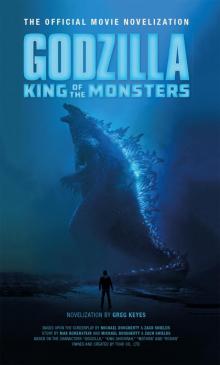 Godzilla
Godzilla Godzilla vs. Kong
Godzilla vs. Kong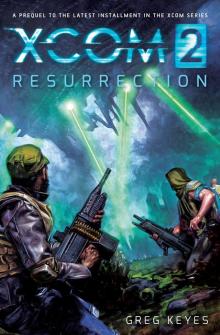 XCOM 2- Resurrection
XCOM 2- Resurrection Independence Day: Crucible (The Official Prequel)
Independence Day: Crucible (The Official Prequel)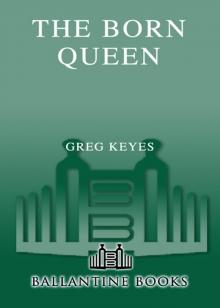 The Born Queen
The Born Queen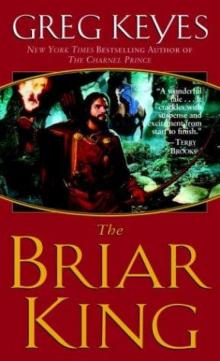 The Briar King
The Briar King Star Wars The New Jedi Order - Dark Journey - Book 10
Star Wars The New Jedi Order - Dark Journey - Book 10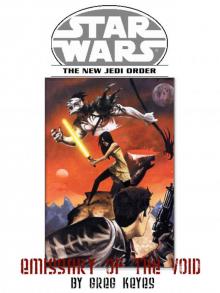 Star Wars: New Jedi Order Book 8b: Emissary of the Void
Star Wars: New Jedi Order Book 8b: Emissary of the Void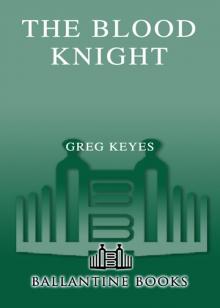 The Blood Knight
The Blood Knight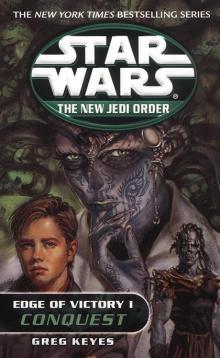 Star Wars - Edge of Victory - Book 1: Conquest
Star Wars - Edge of Victory - Book 1: Conquest Edge of Victory 2 Rebirth
Edge of Victory 2 Rebirth Lord of Souls: An Elder Scrolls Novel
Lord of Souls: An Elder Scrolls Novel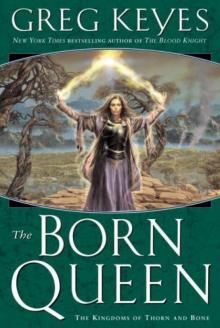 The Born Queen tkotab-4
The Born Queen tkotab-4 Rebirth: Edge of Victory II
Rebirth: Edge of Victory II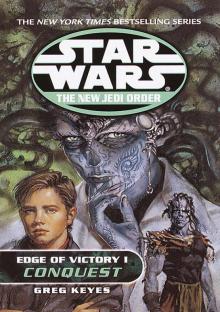 Conquest: Edge of Victory I
Conquest: Edge of Victory I Emissary of the Void
Emissary of the Void The Blackgod
The Blackgod Star Wars The New Jedi Order - The Final Prophecy - Book 19
Star Wars The New Jedi Order - The Final Prophecy - Book 19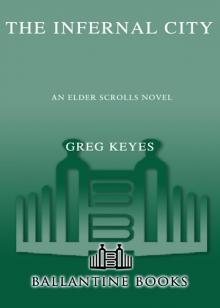 The Infernal City
The Infernal City The Charnel Prince
The Charnel Prince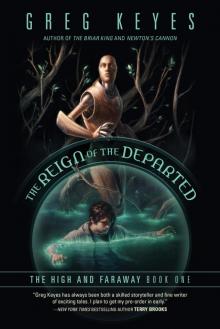 The Reign of the Departed
The Reign of the Departed Lord of Souls es-2
Lord of Souls es-2 Chosen of the Changeling
Chosen of the Changeling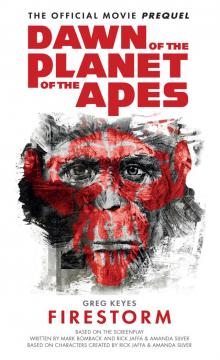 Dawn of the Planet of the Apes
Dawn of the Planet of the Apes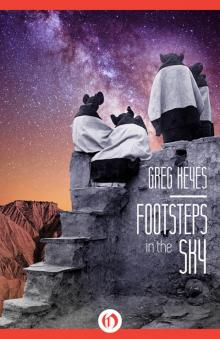 Footsteps in the Sky
Footsteps in the Sky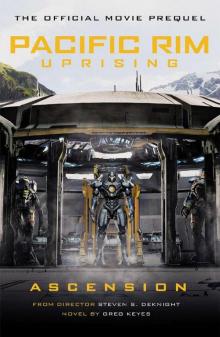 PACIFIC RIM UPRISING ASCENSION
PACIFIC RIM UPRISING ASCENSION The Final Prophecy: Edge of Victory III
The Final Prophecy: Edge of Victory III